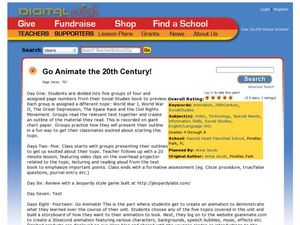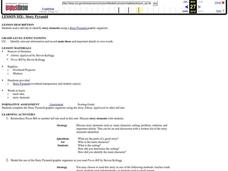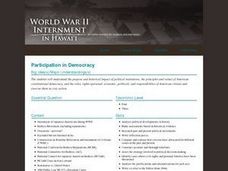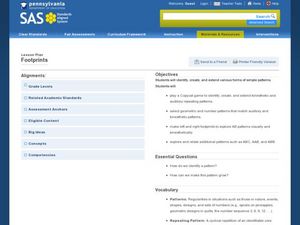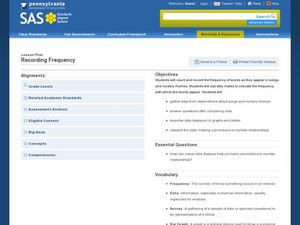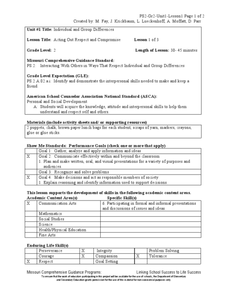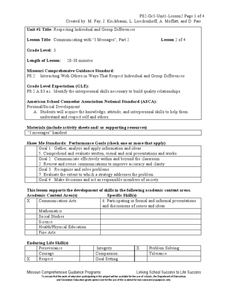Curated OER
How Are Polymers Utilized in Everyday Life?
Students investigate polymers and their uses in everyday life. In this polymers instructional activity, students are assigned one of the 10 areas of polymer science and they do research on their assigned area using the internet. Students...
Curated OER
Go Animate the 20th Century!
Young scholars create animations to match their social studies. in this 20th century lesson, students work in groups to read and present to their classmates World War I, World War II, The Great Depression, The Space Race, or the Civil...
Curated OER
Medieval Newspaper Continued
Students write an article in a newspaper. For this writing and editing lesson, students review how to write for a newspaper, type their articles, and engage in peer editing.
Curated OER
Media Messages
Students analyze advertisements and decide what message is being conveyed. For this media lesson, students analyze drawings from a tall tale. Students view drawings from the book Johnny Appleseed and discuss the colors of the drawings...
Curated OER
Story Pyramid
Students read tall tales to identify story elements. In this story elements instructional activity, students read about Johnny Appleseed and Pecos Bill and use graphic organizers to record information. Students read in small groups,...
Curated OER
Participating in Democracy
Students analyze film clips in class. In this democracy lesson, students identify the differences between civil liberties, democracy and freedom. Students view a video regarding Japanese internment and answer study questions as well as...
Curated OER
How Can We Make a Model of Lungs?
Fifth graders examine the function of the lungs and create a model of the lungs. Using a plastic cup, drinking straw, plastic bag, small balloon, and a rubber band, they follow step-by-step directions to construct simulated lungs. ...
Curated OER
How Are Clouds and Fog Formed?
Fifth graders investigate how clouds and fog are made of tiny droplets of water. They discuss how clouds and fog are formed, then conduct an experiment in which they observe what happens when an ice cube is placed on top of a bottle...
Curated OER
Extending Vocabulary to Describe Communities
Second graders study vocabulary to describe their community. In this meaning of words lesson, 2nd graders acquire new vocabulary words to label pictures and objects. They use these words in speaking and writing.
Curated OER
Junk Sort
Students analyze objects by one or more attributes. In this sorting lesson, students use manipulatives and string or yarn to create a sorting game. Students read books and items from the classroom to sort.
Curated OER
Footprints
Students explore patterns. In this patterns geometry lesson, students identify and extend patterns including body parts, movement, geometric shapes, noises, and footprints. Students create and share an original pattern.
Curated OER
Recording Frequency
First graders analyze nursery rhymes and gather data about word frequency. In this frequency lesson plan, 1st graders create graphs and tables. Students interpret the data.
Curated OER
I Have No Money, Would You Take Wampum
Students engage in a discussion about their experiences with goods, services, and money. In this bartering lesson, students read The Wampum Bird story and brainstorm their personal experiences with economics.
Pennsylvania Department of Education
Exploring Key Ideas and Details in Fiction and Nonfiction
Third graders participate in activities to differentiate fiction from nonfiction. In this fiction lesson, 3rd graders describe the elements of a fiction story. Students compare and contrast fiction and non fiction elements....
Curated OER
Reading And Summarizing in Science
Students read articles about various scientific topics from a variety of science disciplines and a variety of sources including newspapers, the internet, scientific journals and magazines for students. They review the articles...
Curated OER
Acting Out Respect and Compromise
Second graders answer questions about ways to be a good friend. They list their ideas on the board. Individually, 2nd graders create puppets using a brown paper lunch bag. The puppets practice friendship skills with a partner. They share...
Curated OER
The Changing Times of My Life
First graders discuss different milestones in their life such as bathing, dressing, eating, walking, etc. They brainstorm ideas of how the changes affected their life from the moment they occurred to the present. Students brainstorm and...
Curated OER
Communicating with "I Messages", Part 2
Third graders listen to ways they share their feelings with others. After brainstorming situations where "I messages" would be appropriate, pairs of students write messages from the lists they developed. They discuss how their messages...
Curated OER
A Constructivist Version of the Snail & Elodea Lab
Students explain the importance of having a control when setting up an experiment.
Curated OER
Amazing Desert Dwellers
Students explore the many adaptations desert animals have made to survive in their challenging habitat. They use this information to invent new creatures well-suited for desert life.
Curated OER
In the Public's Eyes
Students examine the views of Serb and American civilians on the sustained NATO air strikes on Serbia and focus on how public opinion affects and reflects the overall morale and attitudes in a country.
Curated OER
All Mixed Up
Students explore the emergence of bootlegs, also known as 'mash-ups' (the combination of two songs into one), on the Internet. By researching the musical origins of songs and creating and performing their own bootlegs, students gain a...
Curated OER
Social Studies: Campaign Finance Reform
Students develop arguments for and against campaign finance reform, examine federal and state laws that attempt to limit contributions to political candidates, evaluate various plans for campaign finance reform and formulate their own...
Curated OER
'Tis a Long, Long Way to Tipperary!
Students practice finding the location of cities across the world by using an interactive Web site, and figure out the world's time and the value of time zones the world over.

